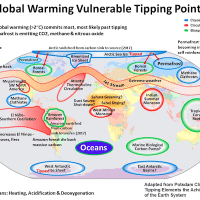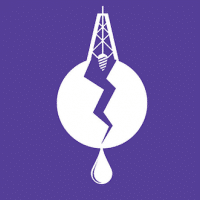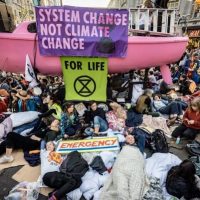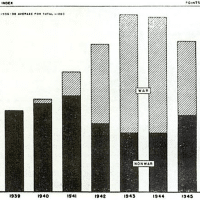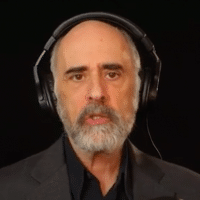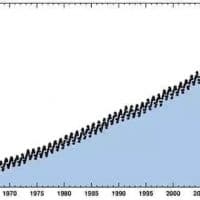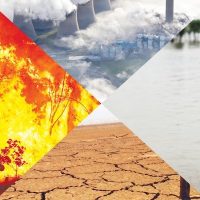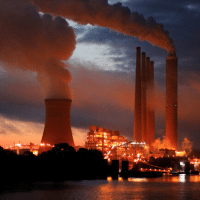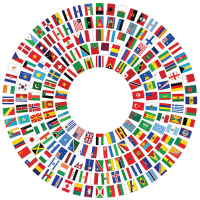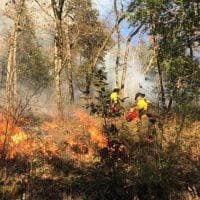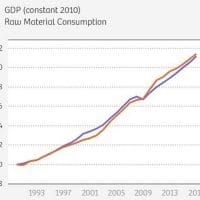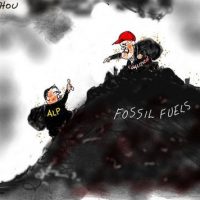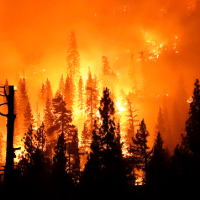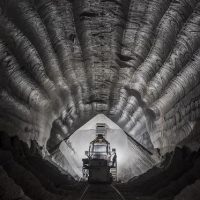-
Engels’ struggle for a dialectical concept of nature
To prevent climate catastrophe, revolutionary decisions are needed based on a widespread understanding of the “dialectics of nature”, which Friedrich Engels, on his joint mission with Karl Marx, sought to explain.
-
Climate and environmental crisis: Sorcerer’s apprentices at the World Bank and the IMF
In December 2020, on the occasion of the fifth anniversary of the signature of the Paris Agreement on Climate, the UN General Secretary sounded the alarm because the situation has fundamentally worsened. In this article we analyze what the World Bank and the IMF have done in connection with the environmental crisis and climate change.
-
We can’t bank on climate action
Bank of England forced to deny taking basic climate actions after hoax from laughtervists, the Yes Men.
-
UN climate report calls out global elite as cause of the crisis
The UN Emissions Gap Report released on Dec. 9, shows how far off the mark we are for averting complete climate catastrophe. Current global emissions reduction policies have us on track for 3.5 C warming by 2100, which would be catastrophic for life on Earth.
-
The planning and politics of conversion: World War II lessons for a Green New Deal—Part 1
This post highlights the successful government directed wartime reorientation of the U.S. economy from civilian to military production, an achievement that both demonstrates the feasibility of a rapid Green New Deal transformation of the U.S. economy and points to the kinds of organizational capacities we will need to develop.
-
No, Joe Biden isn’t going to save us from climate catastrophe
Many have celebrated Joe Biden’s win in the U.S. presidential election as a major turning point in the battle to save the world from climate catastrophe. The liberal media have been Biden’s main advocates. For example, a 12 November editorial in the Guardian argued: “Joe Biden’s win will make a big difference to international efforts to deal with the climate emergency”.
-
Are “net-zero” emissions a smoke screen?
Peter Carter of the Climate Emergency Institute says “net zero” carbon emissions by 2050 and targeting 2 degrees warming are a recipe for runaway climate catastrophe. On theAnalysis.news podcast with Paul Jay.
-
Greenhouse gases set new record, despite COVID-19 lockdown
Top meteorologist: only a complete transformation of our industrial, energy and transport systems can stop climate change.
-
Can we electrify our way out of climate change–or do the rich also need to consume less?
As the Artic sea ice rapidly melts and the communities across the world suffer dire consequences, we are experiencing the tragedies from emitting greenhouse gases from human activities into the atmosphere.
-
Scientists say net zero by 2050 is too late
Climate scientists now believe their predictions about the rate of the global temperature increase have been too conservative, and stronger and more decisive action is needed to reduce dangerous greenhouse gas emissions.
-
Climate Crisis and Imperialism: The Unfair Demonization of the East
Last week in the presidential debate, Donald Trump said “Look at China, how filthy it is. Look at Russia. Look at India. It’s filthy. The air is filthy,” when asked about his decision to pull out of the Paris Climate Accord.
-
Triple Crisis in the Anthropocene Ocean. Part Three: The heat of 3.6 Billion Atom Bombs
Since 1987 the ocean has warmed 4.5 times as fast as in the previous three decades. The Intergovernmental Panel on Climate Change (IPCC) projects that even if emissions are substantially reduced, by 2100 the ocean will heat 2 to 4 times as much as it has since 1970–and if emissions are not cut, it will heat 5 to 7 times as much.
-
The IMF smokescreen
Global emissions fell by 8.8 per cent in the first half of this year amid restrictions on movement and economic activity owing to the coronavirus pandemic, according to a new report.
-
Indigenous solutions to California’s capitalist conflagrations
Colonial timber management and capitalist land use has produced the wildfire crisis we see today. Prescribed Indigenous burning is a viable preventative solution to high severity wildfire but its success hinges on the fight by Indigenous socialists and grassroots organizers for Tribal sovereignty, land restitution, and the creation of a new prescribed fire workforce.
-
A response to McAfee: No, the “Environmental Kuznets Curve” won’t save us
A number of people have asked me to respond to a piece that Andrew McAfee wrote for Wired, promoting his book, which claims that rich countries – and specifically the United States – have accomplished the miracle of “green growth” and “dematerialization”, absolutely decoupling GDP from resource use.
-
How the rich are burning our future
Annual global carbon emissions grew by 60% between 1990 and 2015, approximately doubling total global cumulative emissions in 25 years and catapulting the world towards catastrophic climate change.
-
Media blame gender reveal parties, not climate change, for West Coast fires
The West is on fire, quite literally. A record-breaking heatwave has sparked unprecedented wildfires up and down the coast, turning the sky an apocalyptic, terrifying shade of red.
-
The Dying Planet Report 2020
The report, released September 10th, describes how the over-exploitation of ecological resources by humanity from 1970 to 2016 has contributed to a 68% plunge in wild vertebrate populations, inclusive of mammals, birds, amphibians, reptiles and fish.
-
Triple Crisis in the Anthropocene Ocean. Part Two: Running low on oxygen
Continuing Ian Angus’s examination of the ‘deadly trio’ of CO2-driven assaults on ocean life. Part two: The ocean is losing its breath.
-
Greta Thunberg champions the plight of climate refugees
“Climate crisis could displace 1.2 billion people by 2050,” says Greta Thunberg

